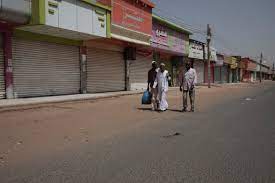APA-Khartoum (Sudan) An uneasy calm appears to be returning to troubled Sudan which has seen deadly clashes since April 15 in an apparent power struggle between two feuding generals.
Junta leader Abdel Fatta al-Burhan and his deputy-turned foe Mohammed Hamdan Dagalo are at the heart of the crisis over disagreements which had boiled over into armed clashes in the streets of Khartoum the capital, Omdurman and spread to other towns and cities across the country.
A shaky truce spearheaded by the United States and other Western powers seems to be holding after three earlier attempts to stop the fighting had failed as Sudanese army regulars loyal to Burhan battled fighters of the self-styled Rapid Special Forces (RSF) led by Dagalo.
For almost ten days the Sudanese capital was a treacherous theatre of war as the belligerents ignored a truce to mark the Muslim feast of Eid following the end of Ramadan last Friday and stuck to their smoking guns.
There were daily shelling from tanks and the straffing of RSF positions by fighter jets manned by personnel of the Sudanese army, leaving a trail of death and destruction unprecedented in Khartoum’s recent history.
Millions of civilians have been caught up in the carnage, setting off a dire humanitarian crisis.
The death toll has been put at just shy of 600, there are fears that close to 1000 people many of them civilians may have been killed in the skirmishes.
Although the smoking guns on both sides have largely fallen silent since Monday, the charred evidence of the conflict still litters the empty streets of Khartoum, where a serious humanitarian crisis has left ordinary helpless people who could not flee in time and remained locked in their homes desperate for relief and a semblance of normalcy.
Others including foreign nationals including non-Sudanese workers of international organisations like the UN have also been scrambling to leave the volatile country before the precarious peace is shattered once again by the near-relentless sounds of mortar, shells and aerial bombardment that were the hallmarks of nine days of hostilities that has left everyone petrified to the bone.
Embassy compounds around Khartoum have been swarmed with people desperate to leave before all hell breaks loose once again.
The truce is not only to serve a humanitarian purpose but to also buy enough time for talks over sustaining the ceasefire and arranging proper dialogue for a definitive end to hostilities and the simmering tension between the two generals who were once strong allies but now implacable foes.
In fact there are unsubstantiated reports suggesting that heavy fighting was still raging in the early hours of Tuesday when the truce should have come into effect.
Burhan and Dagalo’s fighters have been trading belligerent rhetoric while accusing each other of flouting the internationally brokered truce followed by warning of a possible flare-up once again ”if provoked further”.
However, a noticeable pause in the fighting has allowed ordinary Sudanese to gather their wits about them and go in hunt for food or safety or both elsewhere.
Shops and other businesses remain close following a lull in the unrest.
Some of them had bore some of the brunt of the conflict as gangs without any links to both sides went on a looting spree.
The Governor of Khartoum has since issued a statement calling on residents to be vigilant of miscreants in their neighborhoods who see this situation as an opportunity to loot, pillage and plunder.
Meanwhile, the internet which was hit by protracted outages in the past week is back but other essential services like water and electricity are still flagging, residents say, complaining that whole neighbourhoods of Khartoum are plunged into complete darkness for successive nights.
And journalist Ahmed Mahmoud says whatever happens from now on, it is ordinary Sudanese who will face the direst consequences.
”They may stop the war but they will continue to fight the Sudanese people” he warns, making an oblique reference to the state of the transition to civilian rule which forms part of the bone of contention between Sudan’s two feuding generals.
Both men are seriousy divided over the nature and scope of the transition but Dagalo accuses Burhan of ”selling out to dogged Islamists” while the latter says his deputy is hungry for power and opposes his plan to return the country to civilians.
The military has been the preemiment force in Sudanese politics for decades and despite a power-sharing arrangement with civilians after the overthrow of Omar al-Bashir in 2019, the army has not let slip its hold on power.
Bashir himself came to power in a coup thirty years earlier.
Before the conflict, the World Food Programme had warned in August that 15 million or one third of Sudan’s population face acute food insecurity, blaming the situation on drought.
The fallout from the latest conflict is sure to adversely affect local and international efforts to head off this humanitarian challenge complicated by an already worsening cost of living crisis which has seen the Sudanese pound plummet in value.
WN/as/APA


